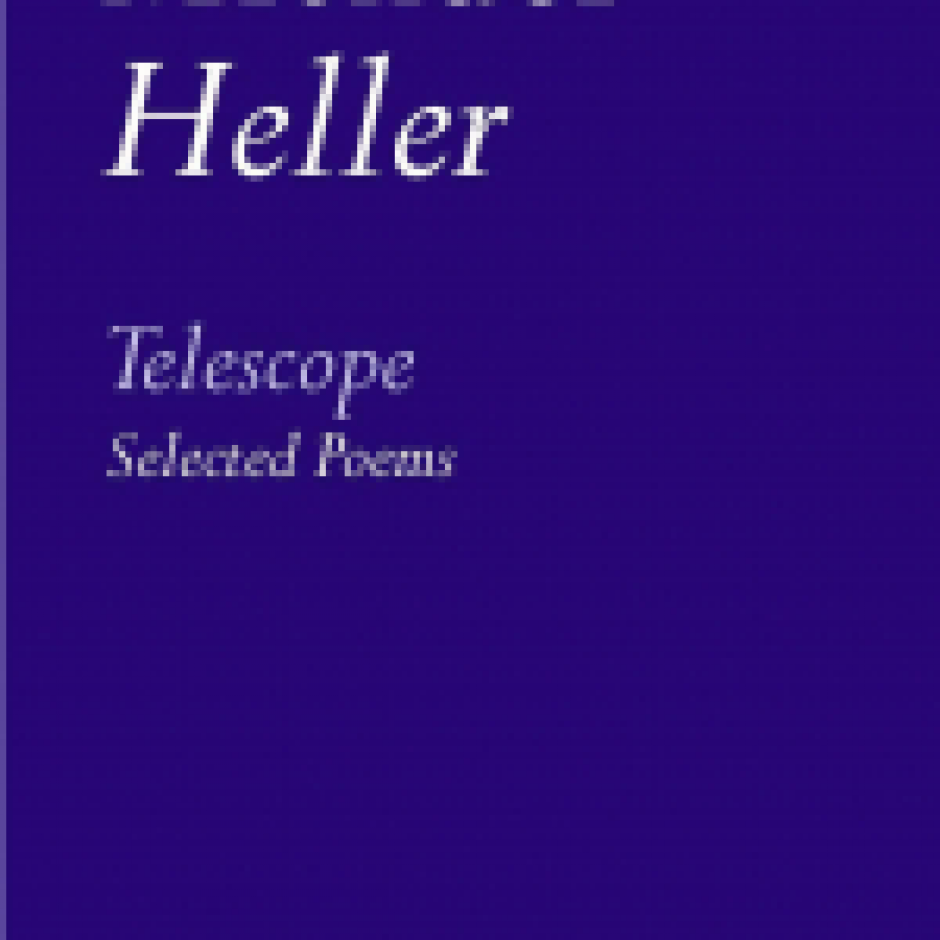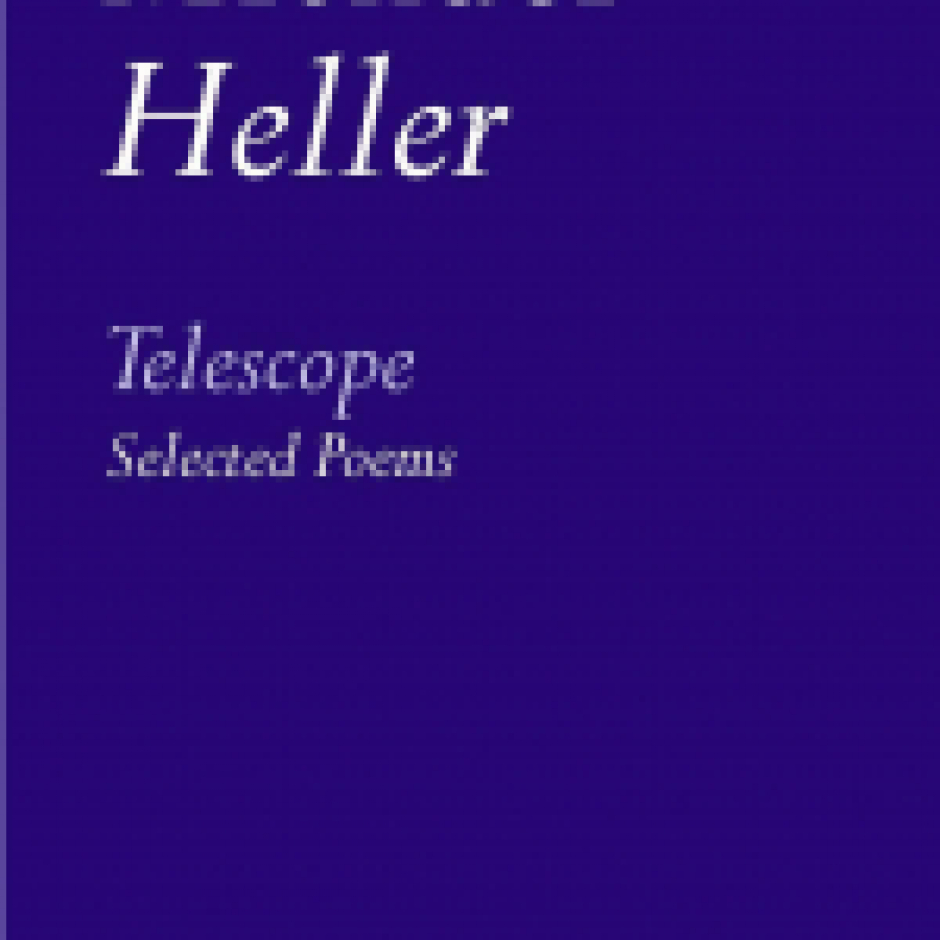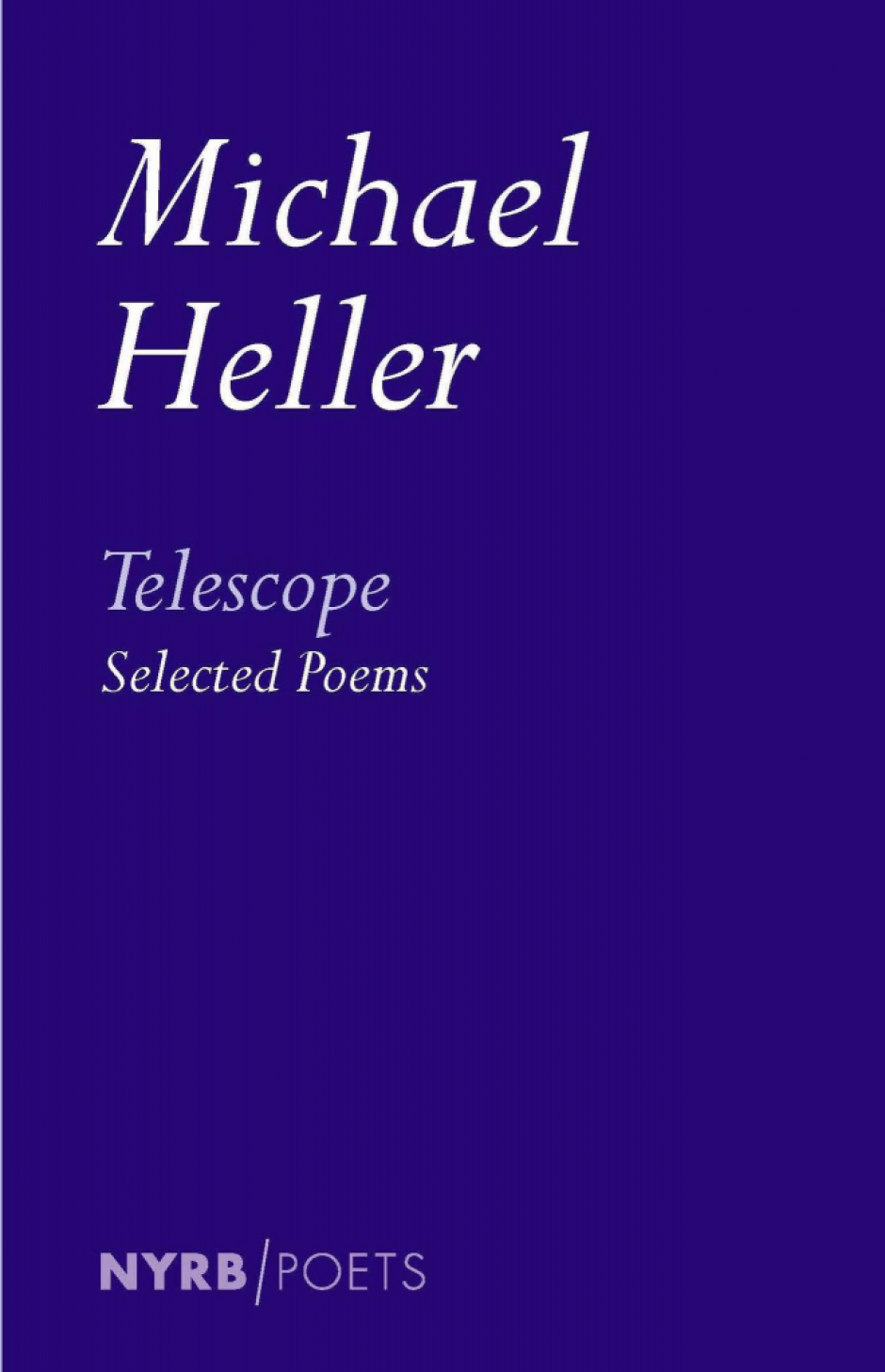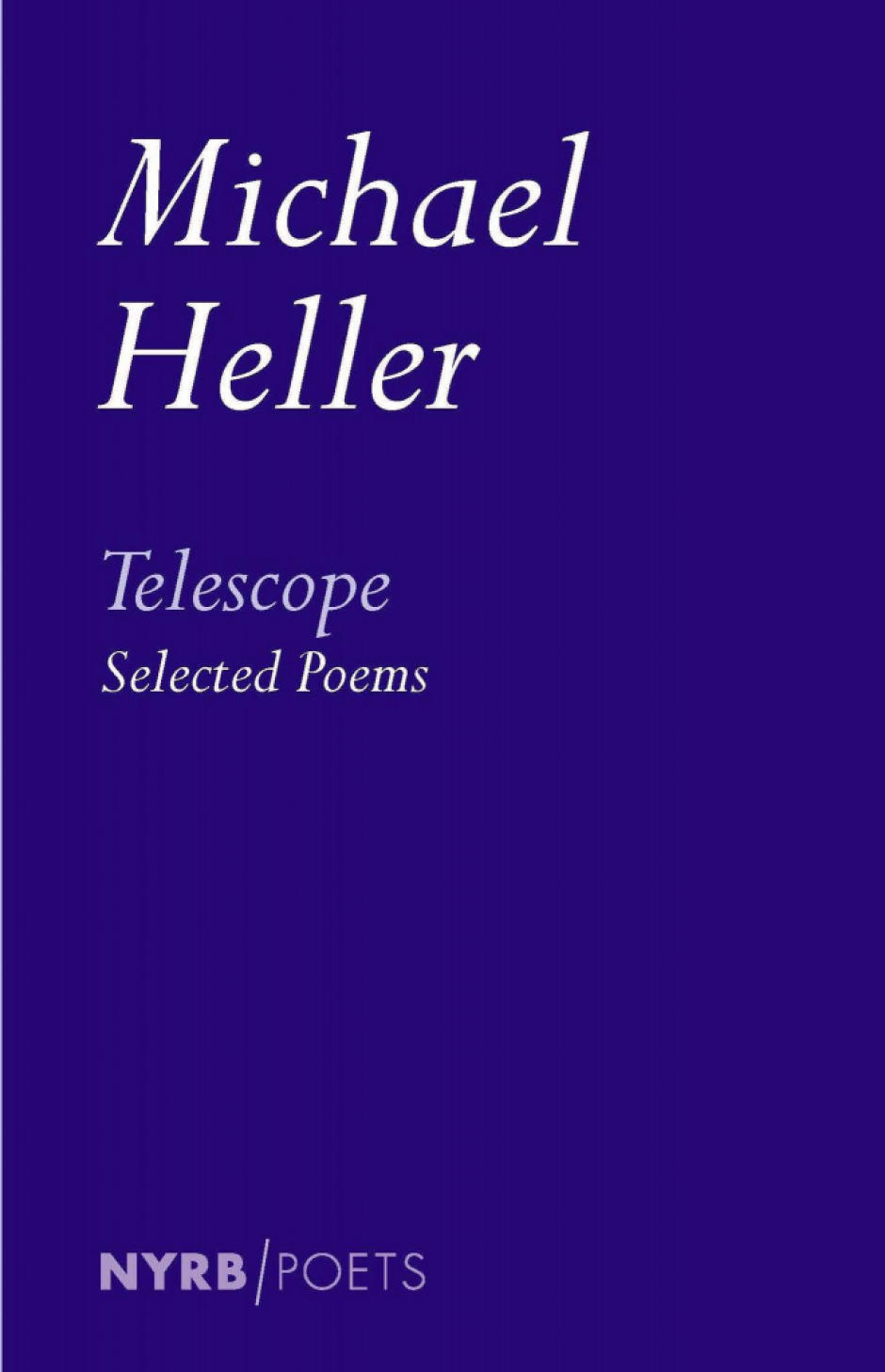Michael Heller Telescope: Selected Poems NYRB Poets £12.99
Although Michael Heller’s work tends to be associated with the Objectivism of Reznikoff and Oppen, that is not the first thing that strikes a reader coming to this nearly 300-page Selected. Not only is this an ample selection from Heller’s career, but it shows a wide sweep of both style and subject matter. And perhaps that sweep is, actually, where the Objectivism comes in. As Heller himself has written, part of his project is ‘the impossibility of imagining a resting place for poetry.’ For Heller, the key here is Levinas’ statement that ‘the true poem loses its place, ceases occupation, precisely, and is thus the very opening of space.’ This is the kind of statement that has more mainstream poets and poetics guffawing into their latté. Not that the group of poets associated with the Objectivists ever wanted approval from the ‘mainstream’ anyway. Right from the beginning, in a somewhat self-conscious way, the Objectivists and the avant-garde legacy they bequeathed, always saw themselves as marginalised and ‘outside.’
And yet, this quest to find something pure and untrammelled is an essentially romantic quest, ‘One tries pulling syllables clean, like freeing / old nails from plaster.’ ‘The Chronical Poet’. When Heller looks at a thing, it is with the phenomenologist’s eye that Levinas would applaud. Heller understands that the ways in which we might be objective in the world are always compromised. That it is a ceaseless endeavour to understand that world and view it properly, looking at it with the due regard for what that world actually is and not what we want it to be. Fiona McMahon writing of Zukofsky sums up that project as ‘affirming the need for a greater attentiveness to the language of poetry and an acute awareness of the perceptual realities that shape one’s immediate circumstances.’
‘The Chronical Poet’ goes on,
Undoing the dismantling of
human gantries by listening, as though one had an empty
water glass to his ear, wondering about the other side,
shushing wife, child, visitor, the gnawing of a rat,
to catch sounds between these histories and our apartment.
What is sure to strike the reader here is the beauty of the writing. This writing might see itself as part of the legacy of the avant-garde but it is not L=A=N=G=U=A=G=E poetry. There is an attempt to disrupt with the line breaks between prepositions and nouns, and adjectives and nouns. But there is, surely, no large scale jemmying off of the signifier from the signified. The image of listening as though through an empty water glass attempts to pin down a particular kind of sensory perception that a phenomenologist such as Merleau-Ponty would have fully recognised; that sense that the body itself perceives and that bodily perception is as valid and an important as that mediated through the senses. If the ‘human gantries’ are dismantled, it is to empty a space in which the sounds of life can be caught and imbue the world/apartment that we inhabit. In all this, Heller seems to display a yearning for what might actually be real and for the ways of ‘catching’ that reality.
It’s possible that what all this means is a deeper, self-aware empathy. In his elegy for Mary Oppen, the wife of his mentor George Oppen, Heller describes a meeting with Mary Oppen after George’s death,
Your painter’s eye
picked out the sights, weighing and measuring
the dry California light, the brown wiry grasses
ruffling. Later at Marie’s, the tick of the pine
mingled with house talk: poems, art, Jeffers’ Tor,
the harsh look you shot at those you’d barely suffer,
these were as balks for you against the age.
In part, of course, this portrait of Mary Oppen is as much interpretation as it is description. And there is a possible sense that Heller is not one of those that Mary Oppen (and by implication he) barely suffers; thus there is a feeling of them and us. However, if as noted above, Heller’s writing is self-aware enough to see that it is interpretation, what the poem recognizes in Mary Oppen is also that ability to see and describe; the light, the grasses, the pine trees. And, as the poem goes on to depict, Mary Oppen’s ability to interpret that in the collages she produced after George’s death. Heller’s empathy presents a relatively unvarnished portrait of Mary Oppen who, ‘judged- / frightening those near you – a sharpened knife to pare / out Mary, not the poet’s wife.’
The last third of the book is taken up with poems which are often more meditative in tone. Such poems explore Heller’s Jewish heritage, but also the Buddhism that he has adopted. ‘Afikomens’ from his 2012 book This Constellation is a Name, is broken down into nine sections. In the section, titled ‘Sharing’, Heller compares ‘sharing Jewish history’ in Paris and New York. In Paris, there are plaques of the students taken on the walls of every school where that happened, in New York,
there are
only shards and splinters, bits of matzoh farfel
to mark the spot. Always the pavement lies
underfoot, always, while the heel grinds
the rest to dust, one has in one’s hand
the piece entire.
Here, the ‘chronical poet’, can see the relation between the parts and the whole, with the whole being felt in the body of the narrator. Although the narrator tries to share, there is a moment when what might be shared is lost and ground to dust. In that moment, what needs to be shared also needs to be possessed as personal and embodied; the perceptual reality that shapes the circumstance of the poem
Such shaping is central to the final poem of this sequence, ‘At My Father’s Grave’. Here, Heller describes bringing a pebble to his father’s grave in the traditional Jewish way. It finishes,
This pebble is a weight upon a stone,
a weight upon a weight, a presence
upon an absence. I do not part
with my love for you. It is never apart.
These lapidary (pun intended) lines are a nice enactment of the process they depict; each word laid precisely one upon and against each other; the endings of the final two lines ending with ‘part/apart’ also play the process of parting on itself.
The final quarter of Heller’s Selected swells out into parts of an ongoing sequence ‘Tibet: A Sequence’, where Tibet is a country of the mind more than it is an actuality. Heller, here, acknowledges a debt to poems written by Victor Segalen, a French poet and archaeologist who lived at the end of the nineteenth and the beginning of the twentieth centuries. Heller comments that Segalen’s poems attempt ‘to mimic the language of the sages whose genius, compassion and knowledge of the illusory self he venerated’. The language of Heller’s poems is unabashedly rhetorical. It must be said, however, that, if these poems succeed, then they succeed because Heller is not afraid to push the language towards the ecstasies to which he aspires. In the subsection, ‘Meditation’, Heller writes,
Here the self’s ransom and the crude meditation;
here falls the torrents of rain and of gratitudes,
the sky spilling tears on the fullness of me.
All abundance, a cataract pummelling me.
Of course, a little of this might go a very long way. And Heller appears to acknowledge this by interleaving these poems with others that meditate, in very concrete terms, on the Judaism within which he is clearly unafraid to inhabit and tussle, as we have seen above his poem on his father. In ‘Abide with Me a Moment’ a homage to another poet, Allen Grossman, Heller writes,
And I guess if one can call it
a belief, then mine was, if nothing else,
the Holy One had gone missing, and I was left
to raise other thrones from the now abandoned
language of observation and objection.
If God has absconded, then the poet is tempted to replace ‘him’ with the divinization of language, the language of how we might see, but also the language of scepticism. Even in that moment, those ‘thrones’ might be made of plaster and tat, language itself absconding under the pressure of its own scrutinies.
Heller is clearly a poet of considerable range and learning. This volume presents a writer who has charted a clear-eyed path through the poetics of his own time. There is a lot to be learned from it, particularly, perhaps, about what it means to live through one’s writing and what that kind of living inevitably entails.




